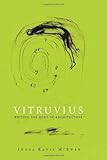Vitruvius : writing the body of architecture / Indra Kagis McEwen.
Τύπος υλικού: ΚείμενοΛεπτομέρειες δημοσίευσης: Cambridge, Mass. : MIT Press, 2003Περιγραφή: x, 493 σ. : εικ. ; 21 εκISBN:
ΚείμενοΛεπτομέρειες δημοσίευσης: Cambridge, Mass. : MIT Press, 2003Περιγραφή: x, 493 σ. : εικ. ; 21 εκISBN: - 9780262134156
- 97802620633062
- 720.1 23
| Τύπος τεκμηρίου | Τρέχουσα βιβλιοθήκη | Ταξιθετικός αριθμός | Αριθμός αντιτύπου | Κατάσταση | Ημερομηνία λήξης | Ραβδοκώδικας |
|---|---|---|---|---|---|---|
![Book [21] Book [21]](https://library.upatras.gr/nereus/nereus-book-yes.png) Book [21]
Book [21]
|
Αρχιτεκτονική Βασική Συλλογή | 720.1 VIT (Περιήγηση στο ράφι(Άνοιγμα παρακάτω)) | 1 | Διαθέσιμο | 025000213487 |
Browsing Αρχιτεκτονική shelves, Shelving location: Βασική Συλλογή Κλείσιμο περιήγησης ραφιού(Απόκρυψη περιήγησης ραφιών)
Περιλαμβάνει βιβλιογραφικές αναφορές και ευρετήριο.
Review: "Vitruvius's De architectura is the only major work on architecture to survive from classical antiquity, and until the eighteenth century it was the text to which all other architectural treatises referred. While European classicists have focused on the factual accuracy of the text itself, English-speaking architects and architectural theorists have viewed it as a timeless source of valuable metaphors. Departing from both perspectives, Indra Kagis McEwen examines the work's meaning and significance in its own time. Vitruvius dedicated De architectura to his patron Augustus Caesar, the first Roman emperor, whose rise to power inspired its composition near the end of the first century B.C. McEwen argues that the imperial project of world dominion shaped Vitruvius's purpose in writing what he called "the whole body of architecture." Devoting each chapter to a different Vitruvian "body," McEwen addresses such topics as the relation of the book and its author to Augustus, the role of beauty in forging the new world order, and the nature and unprecedented extent of Augustan building programs."--Jacket.








